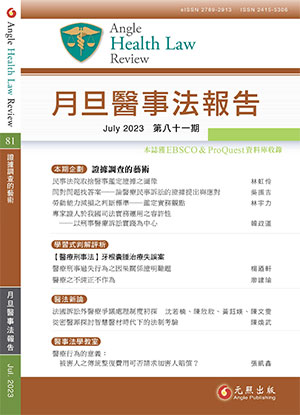醫療行為的意義:被害人之傳統整復費用可否請求加害人賠償?【醫事法學教室】 試閱
The Meaning of “Medical Practice”: Can the Injured Claim Compensation against the Tortfeasor for the Expenses Incurred in Receiving Traditional Folk Osteopathy Conditioning at the Folk Traditional Osteopathic Institute?
在我國,因為衛生福利部以法規命令將傳統國術館、整復館等接受民俗傳統整復調理界定為非醫療行為。因此,原告接受民俗傳統整復調理,或至蔘藥行抓藥所支付之對價,均非接受醫療行為之對價,自亦不能納入「醫療費用」之項目,依民法第192條或第193條請求被告損害賠償。但原告若能舉證證明,上開「醫業類似行為」之費用,係「經過醫師之指示或勸告」,或「對於所受傷害確有在醫療行為通常療效所不及之顯著療效」,且「未逾越依社會觀點上認為合理必要之範圍」,仍得允許原告以非醫療費用之「增加生活上之需要」,依民法第192條或第193條請求被告損害賠償。
The Ministry of Health and Welfare has regulated that receiving traditional folk osteopathy conditioning at the folk traditional osteopathic institutes as non-medical practices. Therefore, the expenses paid by the plaintiff incurred in obtaining traditional Chinese crude drugs from the Chinese drug pharmacy and receiving traditional folk osteopathic conditioning at the folk traditional osteopathic institutes are not the consideration to receive the medical practices and cannot be included in the “medical expenses” to claim for compensation according to Article 192 or Article 193 of the Civil Law. However, suppose the plaintiff can prove that the expenses for such “similar behaviors as the medical practice” are “incurred according to the instructions or advices of doctors” or “effecting curative effect that is beyond the usual curative effect of regular medical practices” and “within reasonable and necessary extent from the social point of view,” the plaintiff may still be allowed to claim damages against the defendant by Article 192 or Article 193 of the Civil Law for such increase of the need in living other than medical expenses.
121-130






